Health Behaviour Change Report: Action Plan, Diary, and Reflection
VerifiedAdded on 2020/02/19
|10
|2443
|122
Report
AI Summary
This report details a student's personal health behavior change plan, focusing on increasing daily walking time. The assignment begins with an introduction outlining the plan, followed by an assessment of the student's baseline behavior and the establishment of a SMART goal to walk 30 minutes daily. The report includes a breakdown of potential barriers and enablers to achieving the goal, as well as planned rewards for success. A four-week diary meticulously documents the student's progress, challenges, and adjustments to the action plan. The report then applies the Transtheoretical Model of Change to reflect on the student's experiences, identifying the stages of change and how the student navigated them. Finally, the report concludes with a reflection on the process, highlighting the effectiveness of self-monitoring and the Transtheoretical Model in facilitating and understanding health behavior change. The student successfully increased their walking time and found the experience positive.
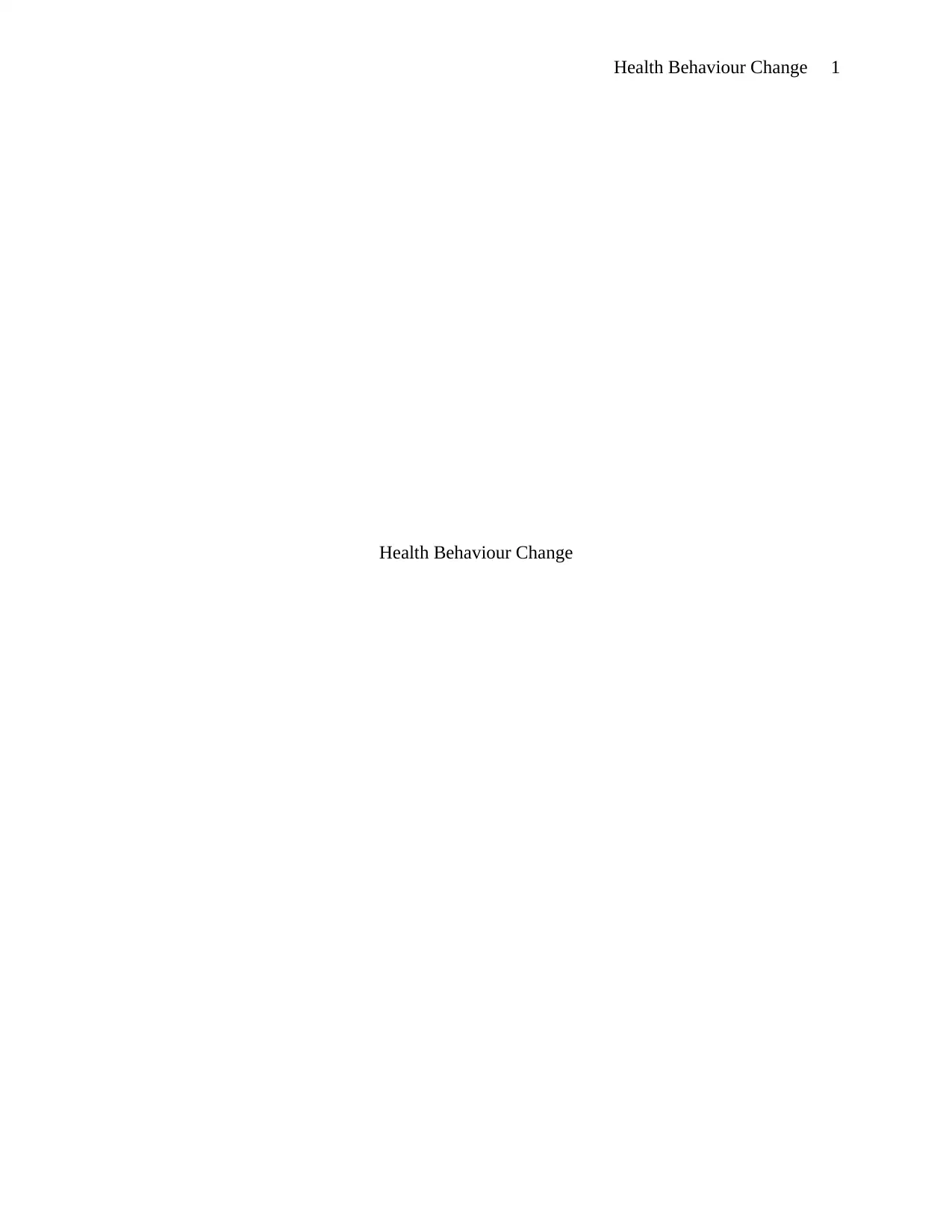
Health Behaviour Change 1
Health Behaviour Change
Health Behaviour Change
Paraphrase This Document
Need a fresh take? Get an instant paraphrase of this document with our AI Paraphraser
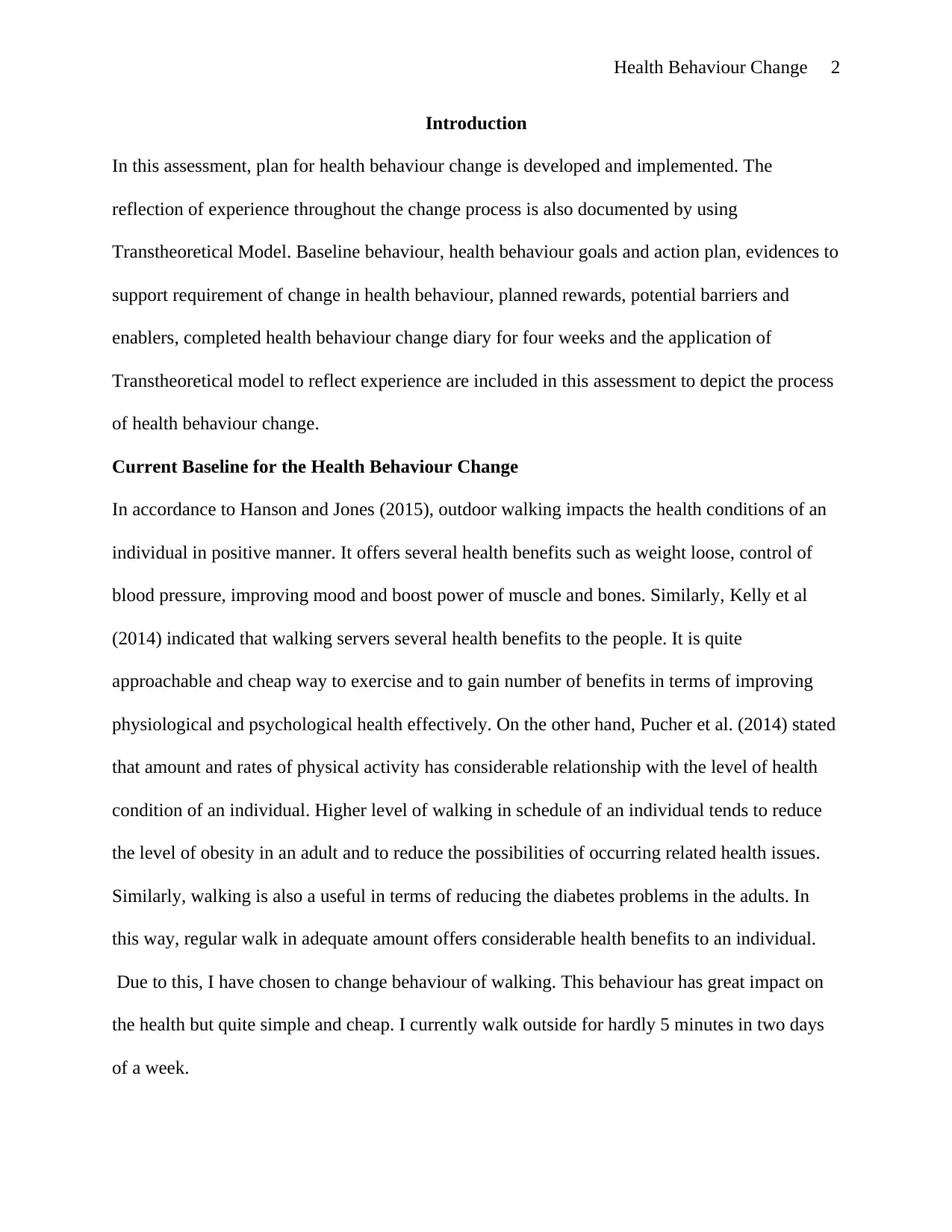
Health Behaviour Change 2
Introduction
In this assessment, plan for health behaviour change is developed and implemented. The
reflection of experience throughout the change process is also documented by using
Transtheoretical Model. Baseline behaviour, health behaviour goals and action plan, evidences to
support requirement of change in health behaviour, planned rewards, potential barriers and
enablers, completed health behaviour change diary for four weeks and the application of
Transtheoretical model to reflect experience are included in this assessment to depict the process
of health behaviour change.
Current Baseline for the Health Behaviour Change
In accordance to Hanson and Jones (2015), outdoor walking impacts the health conditions of an
individual in positive manner. It offers several health benefits such as weight loose, control of
blood pressure, improving mood and boost power of muscle and bones. Similarly, Kelly et al
(2014) indicated that walking servers several health benefits to the people. It is quite
approachable and cheap way to exercise and to gain number of benefits in terms of improving
physiological and psychological health effectively. On the other hand, Pucher et al. (2014) stated
that amount and rates of physical activity has considerable relationship with the level of health
condition of an individual. Higher level of walking in schedule of an individual tends to reduce
the level of obesity in an adult and to reduce the possibilities of occurring related health issues.
Similarly, walking is also a useful in terms of reducing the diabetes problems in the adults. In
this way, regular walk in adequate amount offers considerable health benefits to an individual.
Due to this, I have chosen to change behaviour of walking. This behaviour has great impact on
the health but quite simple and cheap. I currently walk outside for hardly 5 minutes in two days
of a week.
Introduction
In this assessment, plan for health behaviour change is developed and implemented. The
reflection of experience throughout the change process is also documented by using
Transtheoretical Model. Baseline behaviour, health behaviour goals and action plan, evidences to
support requirement of change in health behaviour, planned rewards, potential barriers and
enablers, completed health behaviour change diary for four weeks and the application of
Transtheoretical model to reflect experience are included in this assessment to depict the process
of health behaviour change.
Current Baseline for the Health Behaviour Change
In accordance to Hanson and Jones (2015), outdoor walking impacts the health conditions of an
individual in positive manner. It offers several health benefits such as weight loose, control of
blood pressure, improving mood and boost power of muscle and bones. Similarly, Kelly et al
(2014) indicated that walking servers several health benefits to the people. It is quite
approachable and cheap way to exercise and to gain number of benefits in terms of improving
physiological and psychological health effectively. On the other hand, Pucher et al. (2014) stated
that amount and rates of physical activity has considerable relationship with the level of health
condition of an individual. Higher level of walking in schedule of an individual tends to reduce
the level of obesity in an adult and to reduce the possibilities of occurring related health issues.
Similarly, walking is also a useful in terms of reducing the diabetes problems in the adults. In
this way, regular walk in adequate amount offers considerable health benefits to an individual.
Due to this, I have chosen to change behaviour of walking. This behaviour has great impact on
the health but quite simple and cheap. I currently walk outside for hardly 5 minutes in two days
of a week.
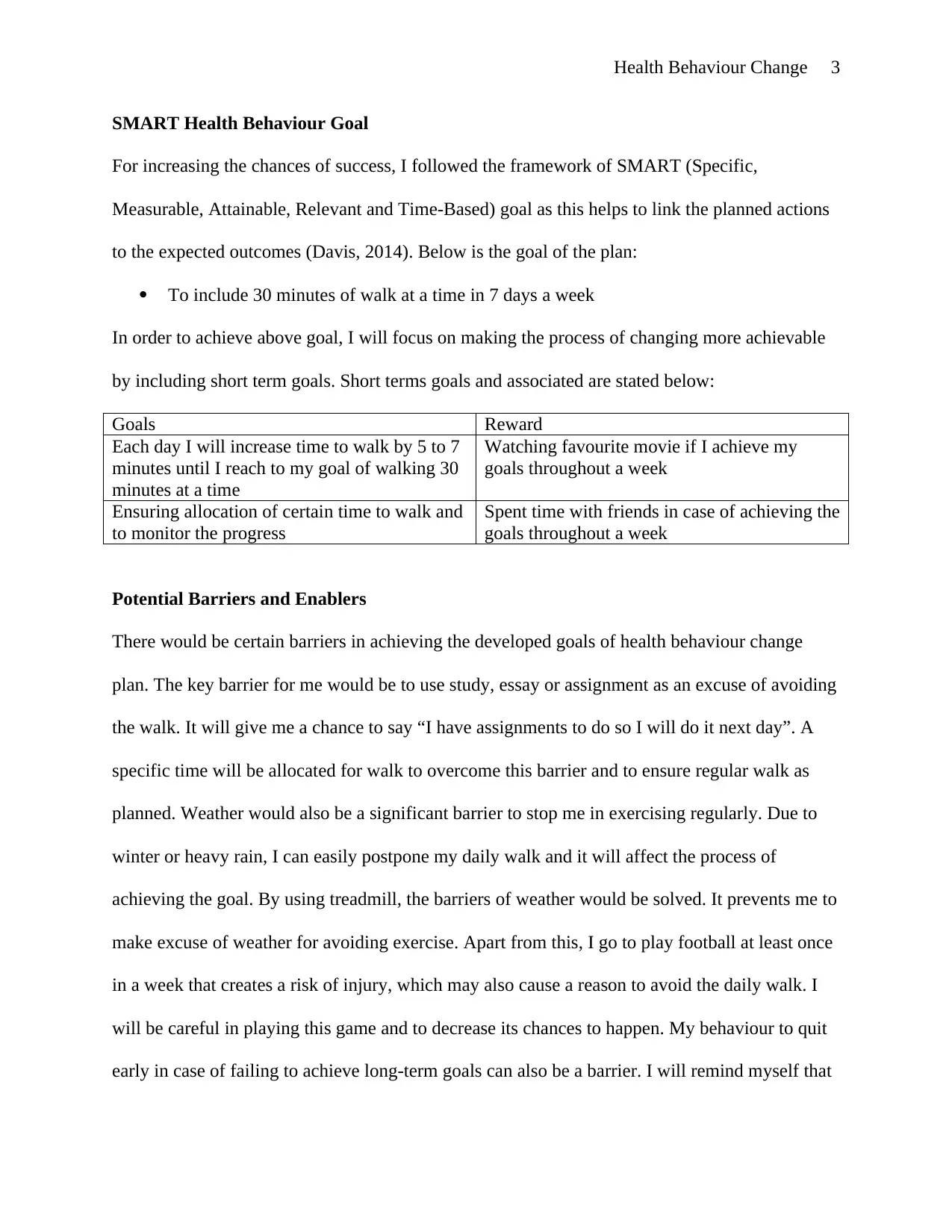
Health Behaviour Change 3
SMART Health Behaviour Goal
For increasing the chances of success, I followed the framework of SMART (Specific,
Measurable, Attainable, Relevant and Time-Based) goal as this helps to link the planned actions
to the expected outcomes (Davis, 2014). Below is the goal of the plan:
To include 30 minutes of walk at a time in 7 days a week
In order to achieve above goal, I will focus on making the process of changing more achievable
by including short term goals. Short terms goals and associated are stated below:
Goals Reward
Each day I will increase time to walk by 5 to 7
minutes until I reach to my goal of walking 30
minutes at a time
Watching favourite movie if I achieve my
goals throughout a week
Ensuring allocation of certain time to walk and
to monitor the progress
Spent time with friends in case of achieving the
goals throughout a week
Potential Barriers and Enablers
There would be certain barriers in achieving the developed goals of health behaviour change
plan. The key barrier for me would be to use study, essay or assignment as an excuse of avoiding
the walk. It will give me a chance to say “I have assignments to do so I will do it next day”. A
specific time will be allocated for walk to overcome this barrier and to ensure regular walk as
planned. Weather would also be a significant barrier to stop me in exercising regularly. Due to
winter or heavy rain, I can easily postpone my daily walk and it will affect the process of
achieving the goal. By using treadmill, the barriers of weather would be solved. It prevents me to
make excuse of weather for avoiding exercise. Apart from this, I go to play football at least once
in a week that creates a risk of injury, which may also cause a reason to avoid the daily walk. I
will be careful in playing this game and to decrease its chances to happen. My behaviour to quit
early in case of failing to achieve long-term goals can also be a barrier. I will remind myself that
SMART Health Behaviour Goal
For increasing the chances of success, I followed the framework of SMART (Specific,
Measurable, Attainable, Relevant and Time-Based) goal as this helps to link the planned actions
to the expected outcomes (Davis, 2014). Below is the goal of the plan:
To include 30 minutes of walk at a time in 7 days a week
In order to achieve above goal, I will focus on making the process of changing more achievable
by including short term goals. Short terms goals and associated are stated below:
Goals Reward
Each day I will increase time to walk by 5 to 7
minutes until I reach to my goal of walking 30
minutes at a time
Watching favourite movie if I achieve my
goals throughout a week
Ensuring allocation of certain time to walk and
to monitor the progress
Spent time with friends in case of achieving the
goals throughout a week
Potential Barriers and Enablers
There would be certain barriers in achieving the developed goals of health behaviour change
plan. The key barrier for me would be to use study, essay or assignment as an excuse of avoiding
the walk. It will give me a chance to say “I have assignments to do so I will do it next day”. A
specific time will be allocated for walk to overcome this barrier and to ensure regular walk as
planned. Weather would also be a significant barrier to stop me in exercising regularly. Due to
winter or heavy rain, I can easily postpone my daily walk and it will affect the process of
achieving the goal. By using treadmill, the barriers of weather would be solved. It prevents me to
make excuse of weather for avoiding exercise. Apart from this, I go to play football at least once
in a week that creates a risk of injury, which may also cause a reason to avoid the daily walk. I
will be careful in playing this game and to decrease its chances to happen. My behaviour to quit
early in case of failing to achieve long-term goals can also be a barrier. I will remind myself that
⊘ This is a preview!⊘
Do you want full access?
Subscribe today to unlock all pages.

Trusted by 1+ million students worldwide
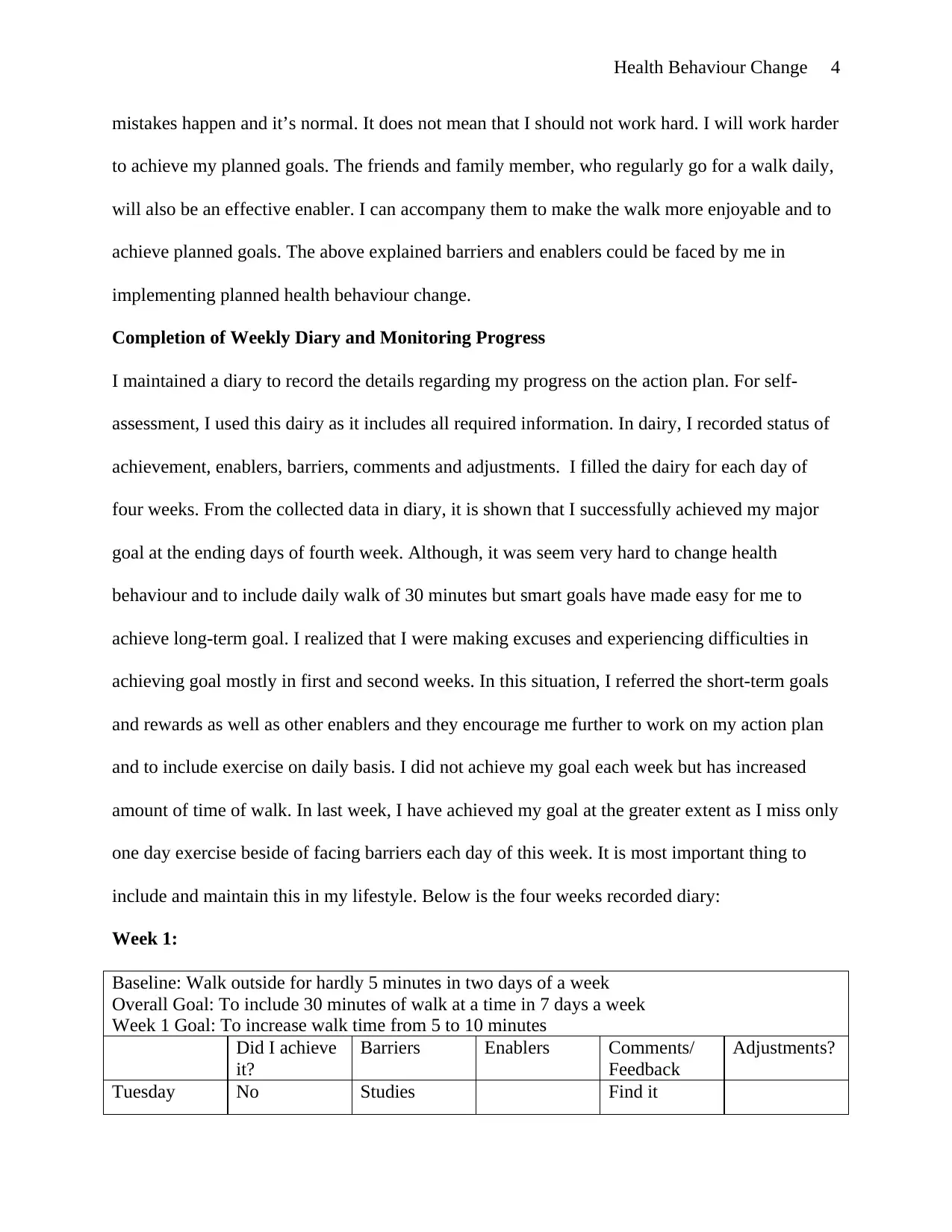
Health Behaviour Change 4
mistakes happen and it’s normal. It does not mean that I should not work hard. I will work harder
to achieve my planned goals. The friends and family member, who regularly go for a walk daily,
will also be an effective enabler. I can accompany them to make the walk more enjoyable and to
achieve planned goals. The above explained barriers and enablers could be faced by me in
implementing planned health behaviour change.
Completion of Weekly Diary and Monitoring Progress
I maintained a diary to record the details regarding my progress on the action plan. For self-
assessment, I used this dairy as it includes all required information. In dairy, I recorded status of
achievement, enablers, barriers, comments and adjustments. I filled the dairy for each day of
four weeks. From the collected data in diary, it is shown that I successfully achieved my major
goal at the ending days of fourth week. Although, it was seem very hard to change health
behaviour and to include daily walk of 30 minutes but smart goals have made easy for me to
achieve long-term goal. I realized that I were making excuses and experiencing difficulties in
achieving goal mostly in first and second weeks. In this situation, I referred the short-term goals
and rewards as well as other enablers and they encourage me further to work on my action plan
and to include exercise on daily basis. I did not achieve my goal each week but has increased
amount of time of walk. In last week, I have achieved my goal at the greater extent as I miss only
one day exercise beside of facing barriers each day of this week. It is most important thing to
include and maintain this in my lifestyle. Below is the four weeks recorded diary:
Week 1:
Baseline: Walk outside for hardly 5 minutes in two days of a week
Overall Goal: To include 30 minutes of walk at a time in 7 days a week
Week 1 Goal: To increase walk time from 5 to 10 minutes
Did I achieve
it?
Barriers Enablers Comments/
Feedback
Adjustments?
Tuesday No Studies Find it
mistakes happen and it’s normal. It does not mean that I should not work hard. I will work harder
to achieve my planned goals. The friends and family member, who regularly go for a walk daily,
will also be an effective enabler. I can accompany them to make the walk more enjoyable and to
achieve planned goals. The above explained barriers and enablers could be faced by me in
implementing planned health behaviour change.
Completion of Weekly Diary and Monitoring Progress
I maintained a diary to record the details regarding my progress on the action plan. For self-
assessment, I used this dairy as it includes all required information. In dairy, I recorded status of
achievement, enablers, barriers, comments and adjustments. I filled the dairy for each day of
four weeks. From the collected data in diary, it is shown that I successfully achieved my major
goal at the ending days of fourth week. Although, it was seem very hard to change health
behaviour and to include daily walk of 30 minutes but smart goals have made easy for me to
achieve long-term goal. I realized that I were making excuses and experiencing difficulties in
achieving goal mostly in first and second weeks. In this situation, I referred the short-term goals
and rewards as well as other enablers and they encourage me further to work on my action plan
and to include exercise on daily basis. I did not achieve my goal each week but has increased
amount of time of walk. In last week, I have achieved my goal at the greater extent as I miss only
one day exercise beside of facing barriers each day of this week. It is most important thing to
include and maintain this in my lifestyle. Below is the four weeks recorded diary:
Week 1:
Baseline: Walk outside for hardly 5 minutes in two days of a week
Overall Goal: To include 30 minutes of walk at a time in 7 days a week
Week 1 Goal: To increase walk time from 5 to 10 minutes
Did I achieve
it?
Barriers Enablers Comments/
Feedback
Adjustments?
Tuesday No Studies Find it
Paraphrase This Document
Need a fresh take? Get an instant paraphrase of this document with our AI Paraphraser
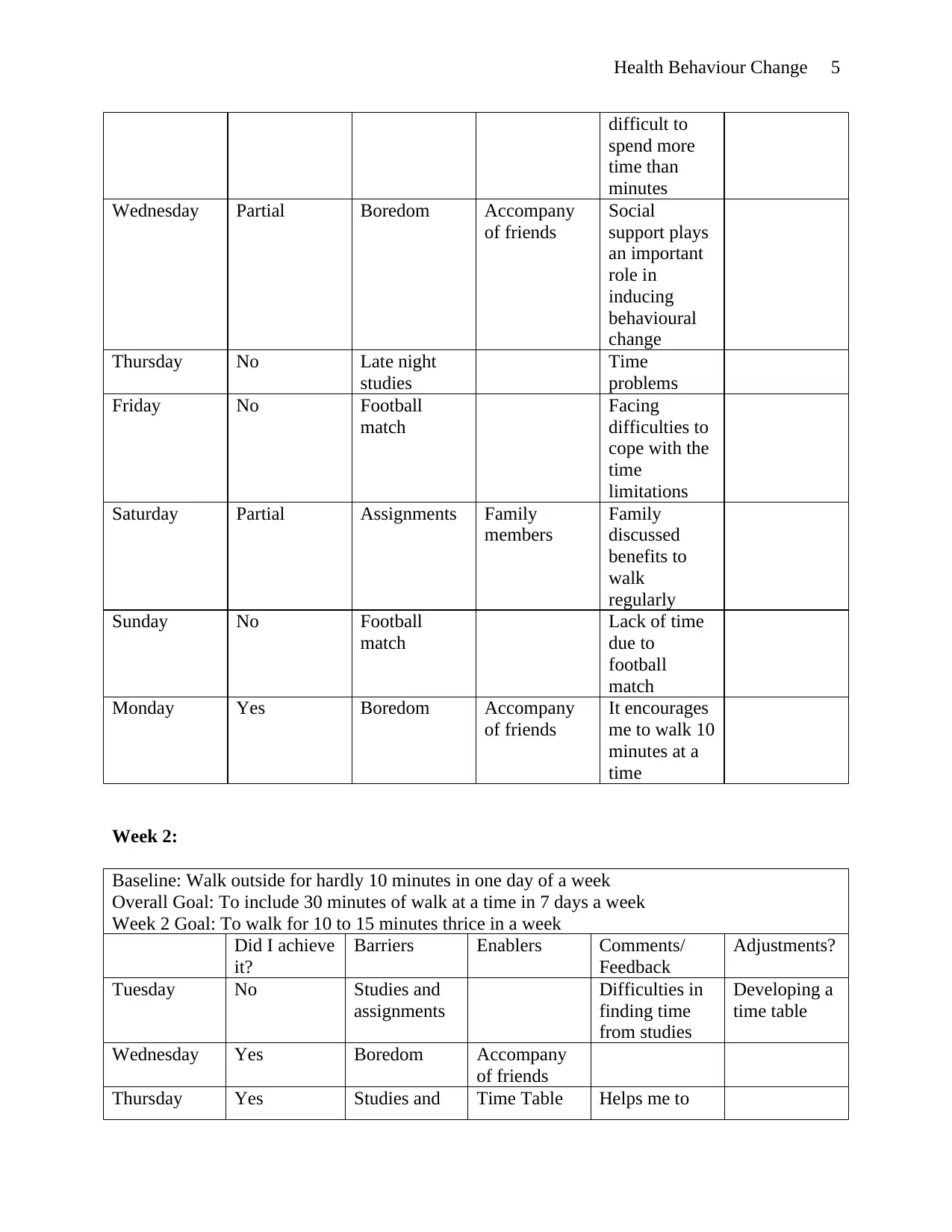
Health Behaviour Change 5
difficult to
spend more
time than
minutes
Wednesday Partial Boredom Accompany
of friends
Social
support plays
an important
role in
inducing
behavioural
change
Thursday No Late night
studies
Time
problems
Friday No Football
match
Facing
difficulties to
cope with the
time
limitations
Saturday Partial Assignments Family
members
Family
discussed
benefits to
walk
regularly
Sunday No Football
match
Lack of time
due to
football
match
Monday Yes Boredom Accompany
of friends
It encourages
me to walk 10
minutes at a
time
Week 2:
Baseline: Walk outside for hardly 10 minutes in one day of a week
Overall Goal: To include 30 minutes of walk at a time in 7 days a week
Week 2 Goal: To walk for 10 to 15 minutes thrice in a week
Did I achieve
it?
Barriers Enablers Comments/
Feedback
Adjustments?
Tuesday No Studies and
assignments
Difficulties in
finding time
from studies
Developing a
time table
Wednesday Yes Boredom Accompany
of friends
Thursday Yes Studies and Time Table Helps me to
difficult to
spend more
time than
minutes
Wednesday Partial Boredom Accompany
of friends
Social
support plays
an important
role in
inducing
behavioural
change
Thursday No Late night
studies
Time
problems
Friday No Football
match
Facing
difficulties to
cope with the
time
limitations
Saturday Partial Assignments Family
members
Family
discussed
benefits to
walk
regularly
Sunday No Football
match
Lack of time
due to
football
match
Monday Yes Boredom Accompany
of friends
It encourages
me to walk 10
minutes at a
time
Week 2:
Baseline: Walk outside for hardly 10 minutes in one day of a week
Overall Goal: To include 30 minutes of walk at a time in 7 days a week
Week 2 Goal: To walk for 10 to 15 minutes thrice in a week
Did I achieve
it?
Barriers Enablers Comments/
Feedback
Adjustments?
Tuesday No Studies and
assignments
Difficulties in
finding time
from studies
Developing a
time table
Wednesday Yes Boredom Accompany
of friends
Thursday Yes Studies and Time Table Helps me to
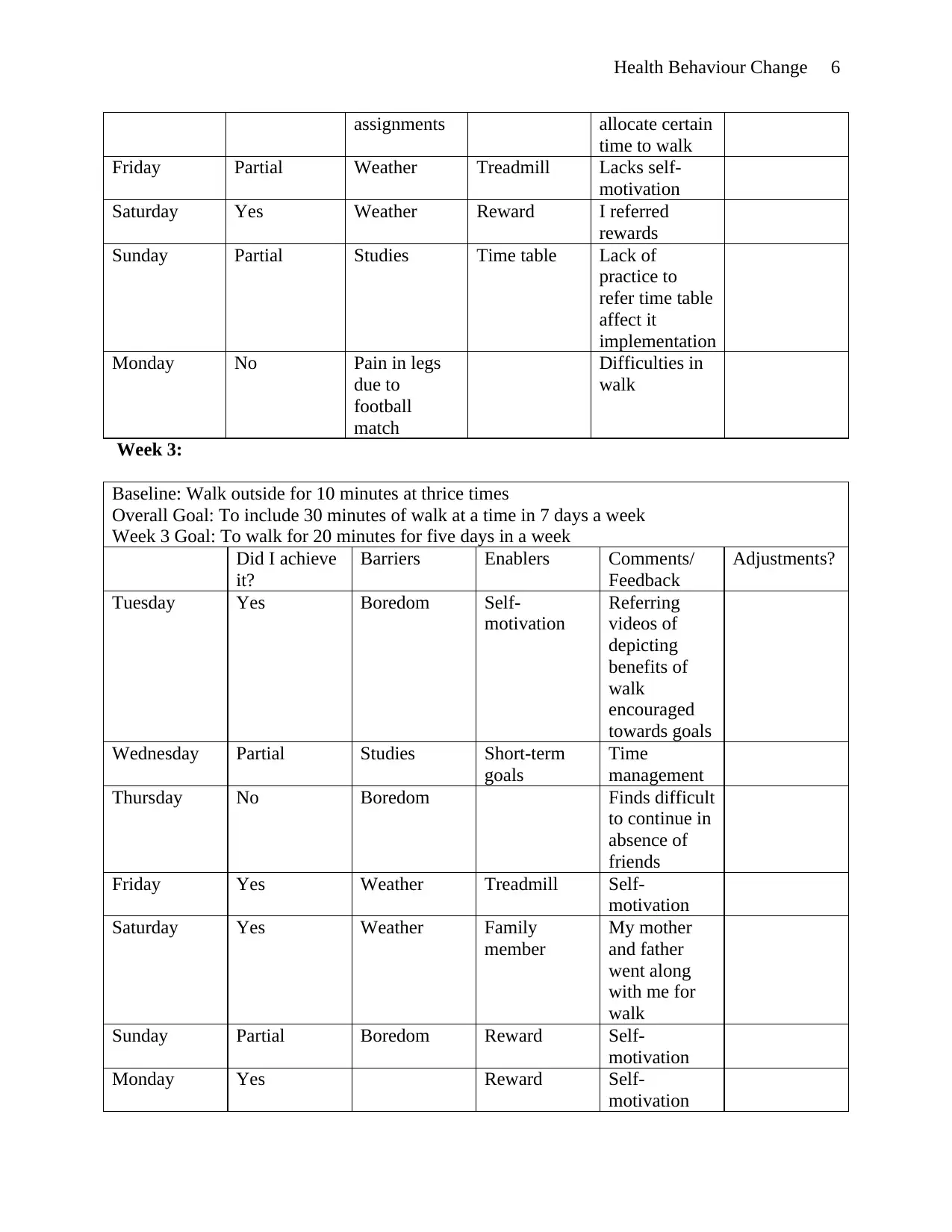
Health Behaviour Change 6
assignments allocate certain
time to walk
Friday Partial Weather Treadmill Lacks self-
motivation
Saturday Yes Weather Reward I referred
rewards
Sunday Partial Studies Time table Lack of
practice to
refer time table
affect it
implementation
Monday No Pain in legs
due to
football
match
Difficulties in
walk
Week 3:
Baseline: Walk outside for 10 minutes at thrice times
Overall Goal: To include 30 minutes of walk at a time in 7 days a week
Week 3 Goal: To walk for 20 minutes for five days in a week
Did I achieve
it?
Barriers Enablers Comments/
Feedback
Adjustments?
Tuesday Yes Boredom Self-
motivation
Referring
videos of
depicting
benefits of
walk
encouraged
towards goals
Wednesday Partial Studies Short-term
goals
Time
management
Thursday No Boredom Finds difficult
to continue in
absence of
friends
Friday Yes Weather Treadmill Self-
motivation
Saturday Yes Weather Family
member
My mother
and father
went along
with me for
walk
Sunday Partial Boredom Reward Self-
motivation
Monday Yes Reward Self-
motivation
assignments allocate certain
time to walk
Friday Partial Weather Treadmill Lacks self-
motivation
Saturday Yes Weather Reward I referred
rewards
Sunday Partial Studies Time table Lack of
practice to
refer time table
affect it
implementation
Monday No Pain in legs
due to
football
match
Difficulties in
walk
Week 3:
Baseline: Walk outside for 10 minutes at thrice times
Overall Goal: To include 30 minutes of walk at a time in 7 days a week
Week 3 Goal: To walk for 20 minutes for five days in a week
Did I achieve
it?
Barriers Enablers Comments/
Feedback
Adjustments?
Tuesday Yes Boredom Self-
motivation
Referring
videos of
depicting
benefits of
walk
encouraged
towards goals
Wednesday Partial Studies Short-term
goals
Time
management
Thursday No Boredom Finds difficult
to continue in
absence of
friends
Friday Yes Weather Treadmill Self-
motivation
Saturday Yes Weather Family
member
My mother
and father
went along
with me for
walk
Sunday Partial Boredom Reward Self-
motivation
Monday Yes Reward Self-
motivation
⊘ This is a preview!⊘
Do you want full access?
Subscribe today to unlock all pages.

Trusted by 1+ million students worldwide
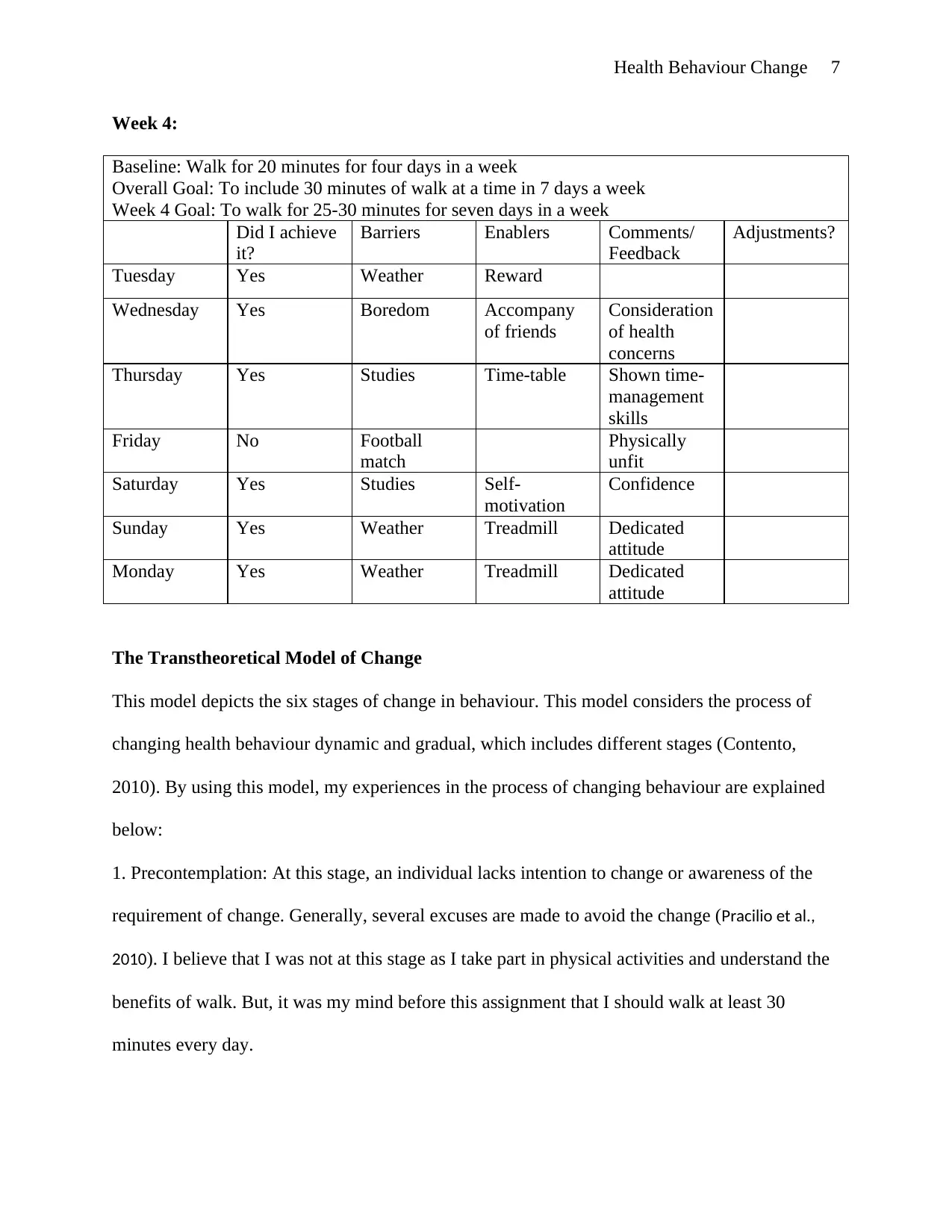
Health Behaviour Change 7
Week 4:
Baseline: Walk for 20 minutes for four days in a week
Overall Goal: To include 30 minutes of walk at a time in 7 days a week
Week 4 Goal: To walk for 25-30 minutes for seven days in a week
Did I achieve
it?
Barriers Enablers Comments/
Feedback
Adjustments?
Tuesday Yes Weather Reward
Wednesday Yes Boredom Accompany
of friends
Consideration
of health
concerns
Thursday Yes Studies Time-table Shown time-
management
skills
Friday No Football
match
Physically
unfit
Saturday Yes Studies Self-
motivation
Confidence
Sunday Yes Weather Treadmill Dedicated
attitude
Monday Yes Weather Treadmill Dedicated
attitude
The Transtheoretical Model of Change
This model depicts the six stages of change in behaviour. This model considers the process of
changing health behaviour dynamic and gradual, which includes different stages (Contento,
2010). By using this model, my experiences in the process of changing behaviour are explained
below:
1. Precontemplation: At this stage, an individual lacks intention to change or awareness of the
requirement of change. Generally, several excuses are made to avoid the change (Pracilio et al.,
2010). I believe that I was not at this stage as I take part in physical activities and understand the
benefits of walk. But, it was my mind before this assignment that I should walk at least 30
minutes every day.
Week 4:
Baseline: Walk for 20 minutes for four days in a week
Overall Goal: To include 30 minutes of walk at a time in 7 days a week
Week 4 Goal: To walk for 25-30 minutes for seven days in a week
Did I achieve
it?
Barriers Enablers Comments/
Feedback
Adjustments?
Tuesday Yes Weather Reward
Wednesday Yes Boredom Accompany
of friends
Consideration
of health
concerns
Thursday Yes Studies Time-table Shown time-
management
skills
Friday No Football
match
Physically
unfit
Saturday Yes Studies Self-
motivation
Confidence
Sunday Yes Weather Treadmill Dedicated
attitude
Monday Yes Weather Treadmill Dedicated
attitude
The Transtheoretical Model of Change
This model depicts the six stages of change in behaviour. This model considers the process of
changing health behaviour dynamic and gradual, which includes different stages (Contento,
2010). By using this model, my experiences in the process of changing behaviour are explained
below:
1. Precontemplation: At this stage, an individual lacks intention to change or awareness of the
requirement of change. Generally, several excuses are made to avoid the change (Pracilio et al.,
2010). I believe that I was not at this stage as I take part in physical activities and understand the
benefits of walk. But, it was my mind before this assignment that I should walk at least 30
minutes every day.
Paraphrase This Document
Need a fresh take? Get an instant paraphrase of this document with our AI Paraphraser
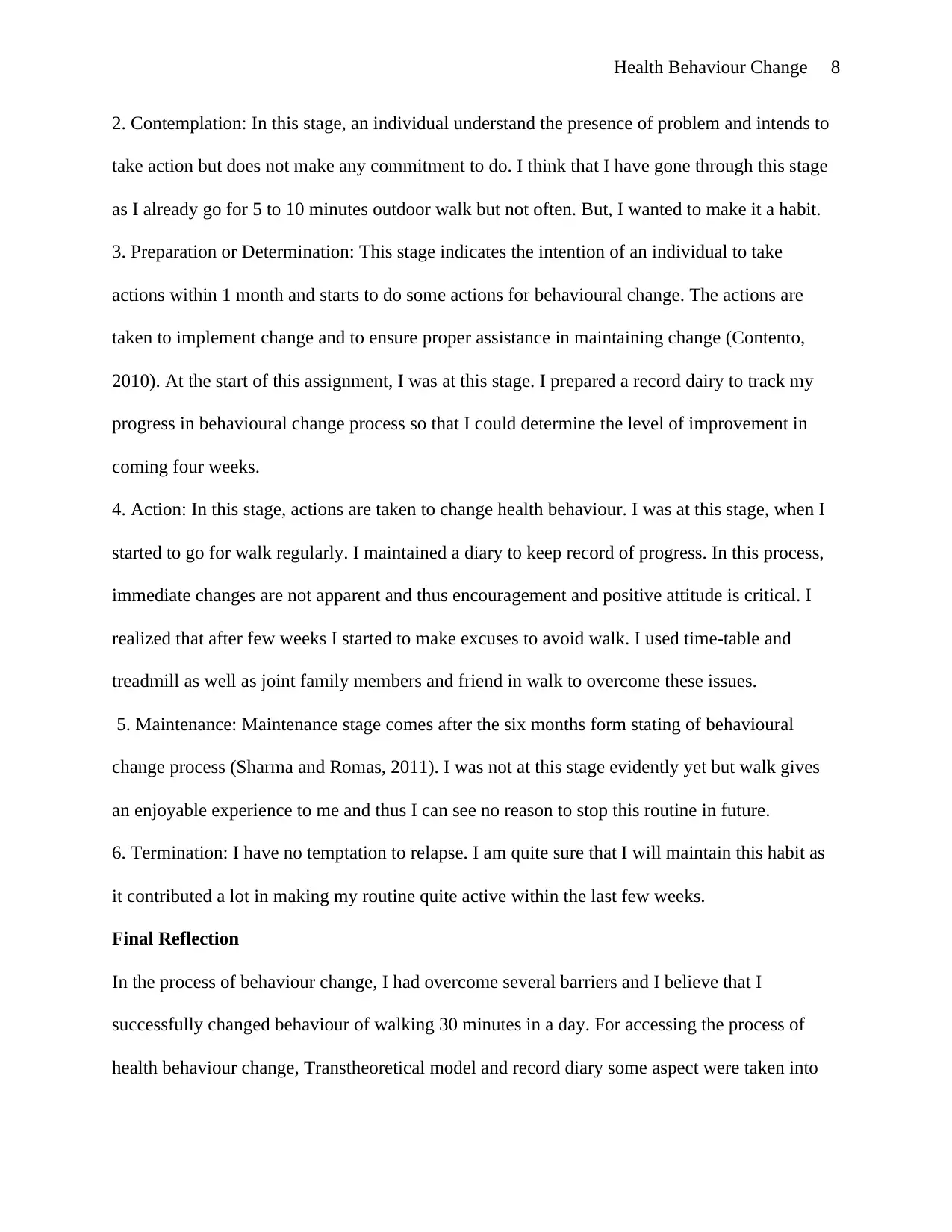
Health Behaviour Change 8
2. Contemplation: In this stage, an individual understand the presence of problem and intends to
take action but does not make any commitment to do. I think that I have gone through this stage
as I already go for 5 to 10 minutes outdoor walk but not often. But, I wanted to make it a habit.
3. Preparation or Determination: This stage indicates the intention of an individual to take
actions within 1 month and starts to do some actions for behavioural change. The actions are
taken to implement change and to ensure proper assistance in maintaining change (Contento,
2010). At the start of this assignment, I was at this stage. I prepared a record dairy to track my
progress in behavioural change process so that I could determine the level of improvement in
coming four weeks.
4. Action: In this stage, actions are taken to change health behaviour. I was at this stage, when I
started to go for walk regularly. I maintained a diary to keep record of progress. In this process,
immediate changes are not apparent and thus encouragement and positive attitude is critical. I
realized that after few weeks I started to make excuses to avoid walk. I used time-table and
treadmill as well as joint family members and friend in walk to overcome these issues.
5. Maintenance: Maintenance stage comes after the six months form stating of behavioural
change process (Sharma and Romas, 2011). I was not at this stage evidently yet but walk gives
an enjoyable experience to me and thus I can see no reason to stop this routine in future.
6. Termination: I have no temptation to relapse. I am quite sure that I will maintain this habit as
it contributed a lot in making my routine quite active within the last few weeks.
Final Reflection
In the process of behaviour change, I had overcome several barriers and I believe that I
successfully changed behaviour of walking 30 minutes in a day. For accessing the process of
health behaviour change, Transtheoretical model and record diary some aspect were taken into
2. Contemplation: In this stage, an individual understand the presence of problem and intends to
take action but does not make any commitment to do. I think that I have gone through this stage
as I already go for 5 to 10 minutes outdoor walk but not often. But, I wanted to make it a habit.
3. Preparation or Determination: This stage indicates the intention of an individual to take
actions within 1 month and starts to do some actions for behavioural change. The actions are
taken to implement change and to ensure proper assistance in maintaining change (Contento,
2010). At the start of this assignment, I was at this stage. I prepared a record dairy to track my
progress in behavioural change process so that I could determine the level of improvement in
coming four weeks.
4. Action: In this stage, actions are taken to change health behaviour. I was at this stage, when I
started to go for walk regularly. I maintained a diary to keep record of progress. In this process,
immediate changes are not apparent and thus encouragement and positive attitude is critical. I
realized that after few weeks I started to make excuses to avoid walk. I used time-table and
treadmill as well as joint family members and friend in walk to overcome these issues.
5. Maintenance: Maintenance stage comes after the six months form stating of behavioural
change process (Sharma and Romas, 2011). I was not at this stage evidently yet but walk gives
an enjoyable experience to me and thus I can see no reason to stop this routine in future.
6. Termination: I have no temptation to relapse. I am quite sure that I will maintain this habit as
it contributed a lot in making my routine quite active within the last few weeks.
Final Reflection
In the process of behaviour change, I had overcome several barriers and I believe that I
successfully changed behaviour of walking 30 minutes in a day. For accessing the process of
health behaviour change, Transtheoretical model and record diary some aspect were taken into
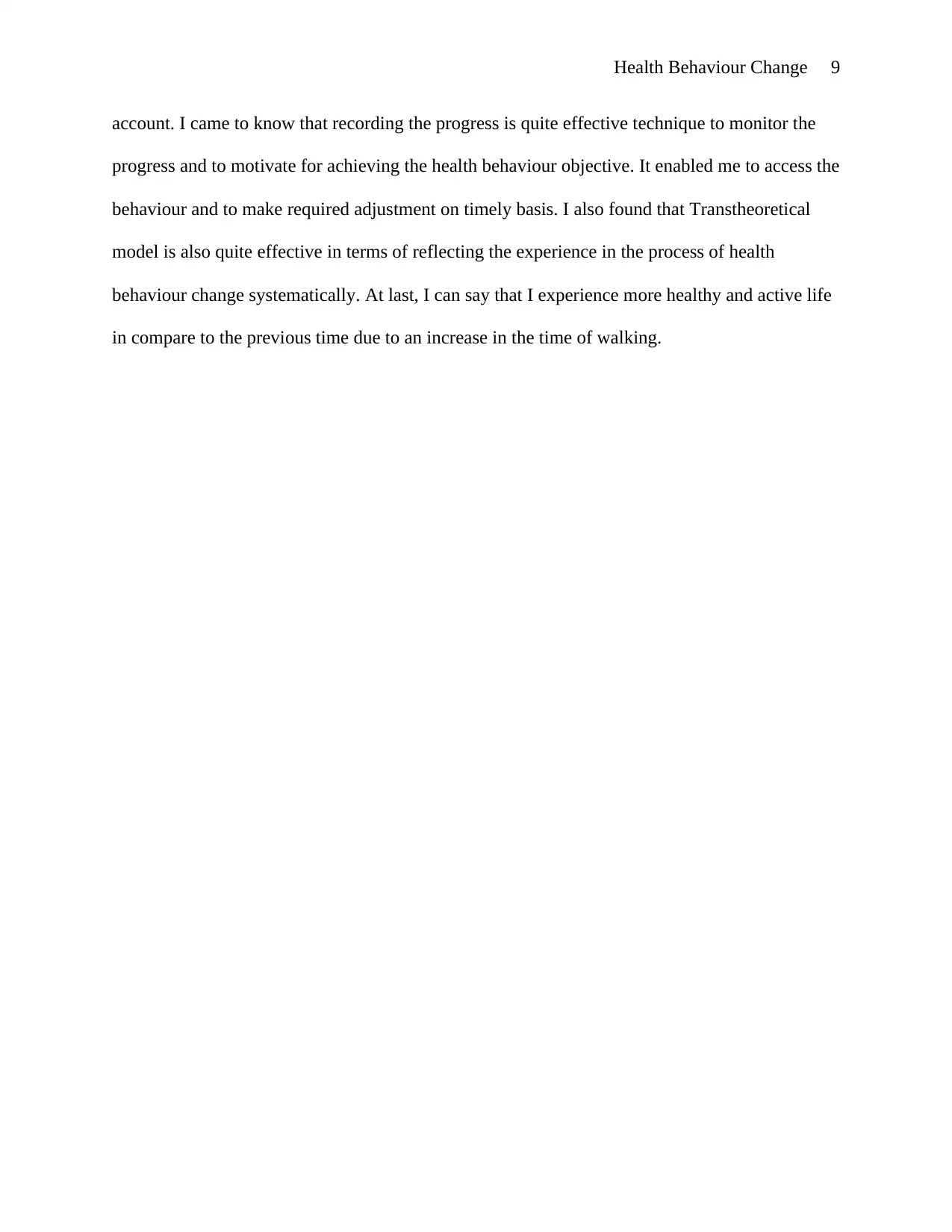
Health Behaviour Change 9
account. I came to know that recording the progress is quite effective technique to monitor the
progress and to motivate for achieving the health behaviour objective. It enabled me to access the
behaviour and to make required adjustment on timely basis. I also found that Transtheoretical
model is also quite effective in terms of reflecting the experience in the process of health
behaviour change systematically. At last, I can say that I experience more healthy and active life
in compare to the previous time due to an increase in the time of walking.
account. I came to know that recording the progress is quite effective technique to monitor the
progress and to motivate for achieving the health behaviour objective. It enabled me to access the
behaviour and to make required adjustment on timely basis. I also found that Transtheoretical
model is also quite effective in terms of reflecting the experience in the process of health
behaviour change systematically. At last, I can say that I experience more healthy and active life
in compare to the previous time due to an increase in the time of walking.
⊘ This is a preview!⊘
Do you want full access?
Subscribe today to unlock all pages.

Trusted by 1+ million students worldwide
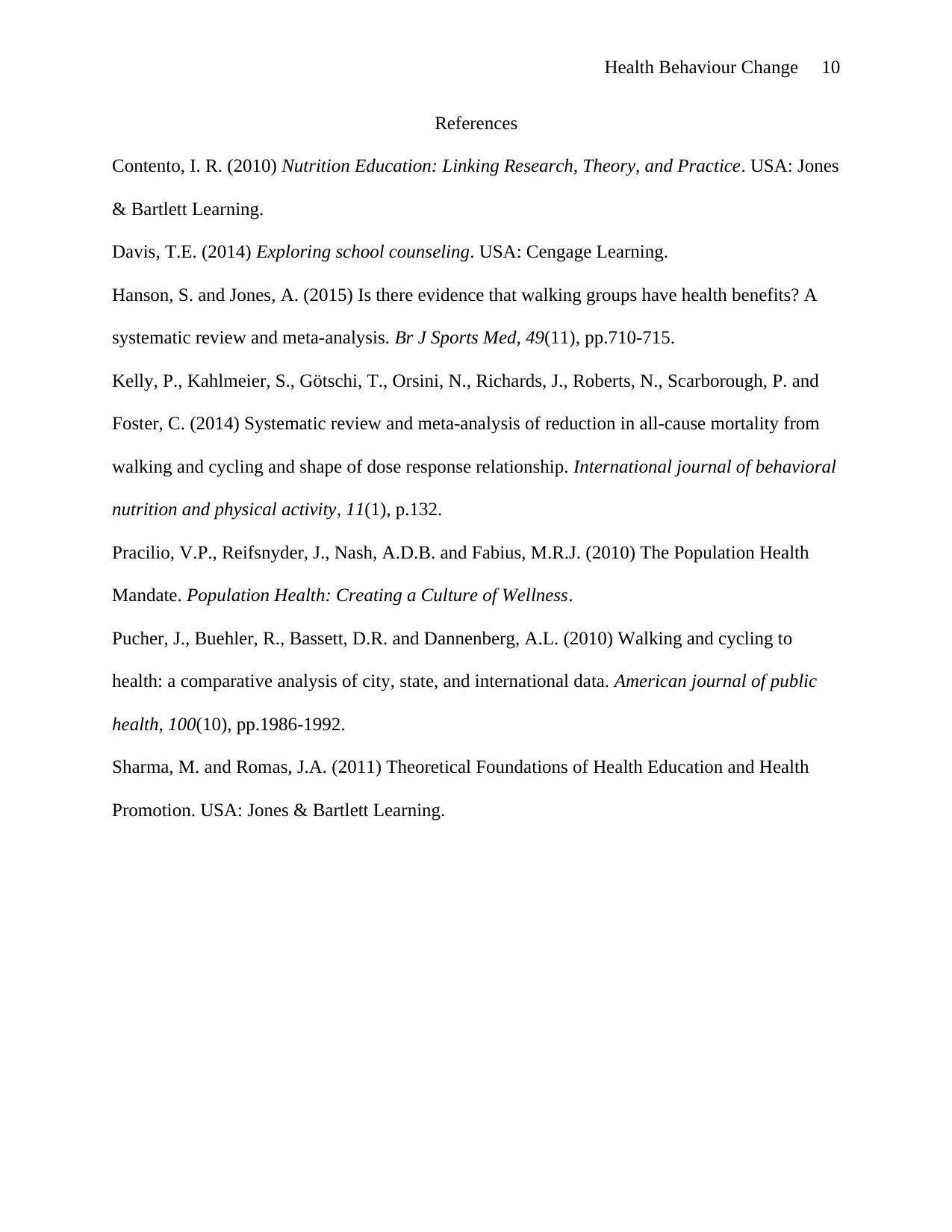
Health Behaviour Change 10
References
Contento, I. R. (2010) Nutrition Education: Linking Research, Theory, and Practice. USA: Jones
& Bartlett Learning.
Davis, T.E. (2014) Exploring school counseling. USA: Cengage Learning.
Hanson, S. and Jones, A. (2015) Is there evidence that walking groups have health benefits? A
systematic review and meta-analysis. Br J Sports Med, 49(11), pp.710-715.
Kelly, P., Kahlmeier, S., Götschi, T., Orsini, N., Richards, J., Roberts, N., Scarborough, P. and
Foster, C. (2014) Systematic review and meta-analysis of reduction in all-cause mortality from
walking and cycling and shape of dose response relationship. International journal of behavioral
nutrition and physical activity, 11(1), p.132.
Pracilio, V.P., Reifsnyder, J., Nash, A.D.B. and Fabius, M.R.J. (2010) The Population Health
Mandate. Population Health: Creating a Culture of Wellness.
Pucher, J., Buehler, R., Bassett, D.R. and Dannenberg, A.L. (2010) Walking and cycling to
health: a comparative analysis of city, state, and international data. American journal of public
health, 100(10), pp.1986-1992.
Sharma, M. and Romas, J.A. (2011) Theoretical Foundations of Health Education and Health
Promotion. USA: Jones & Bartlett Learning.
References
Contento, I. R. (2010) Nutrition Education: Linking Research, Theory, and Practice. USA: Jones
& Bartlett Learning.
Davis, T.E. (2014) Exploring school counseling. USA: Cengage Learning.
Hanson, S. and Jones, A. (2015) Is there evidence that walking groups have health benefits? A
systematic review and meta-analysis. Br J Sports Med, 49(11), pp.710-715.
Kelly, P., Kahlmeier, S., Götschi, T., Orsini, N., Richards, J., Roberts, N., Scarborough, P. and
Foster, C. (2014) Systematic review and meta-analysis of reduction in all-cause mortality from
walking and cycling and shape of dose response relationship. International journal of behavioral
nutrition and physical activity, 11(1), p.132.
Pracilio, V.P., Reifsnyder, J., Nash, A.D.B. and Fabius, M.R.J. (2010) The Population Health
Mandate. Population Health: Creating a Culture of Wellness.
Pucher, J., Buehler, R., Bassett, D.R. and Dannenberg, A.L. (2010) Walking and cycling to
health: a comparative analysis of city, state, and international data. American journal of public
health, 100(10), pp.1986-1992.
Sharma, M. and Romas, J.A. (2011) Theoretical Foundations of Health Education and Health
Promotion. USA: Jones & Bartlett Learning.
1 out of 10
Related Documents
Your All-in-One AI-Powered Toolkit for Academic Success.
+13062052269
info@desklib.com
Available 24*7 on WhatsApp / Email
![[object Object]](/_next/static/media/star-bottom.7253800d.svg)
Unlock your academic potential
Copyright © 2020–2026 A2Z Services. All Rights Reserved. Developed and managed by ZUCOL.




